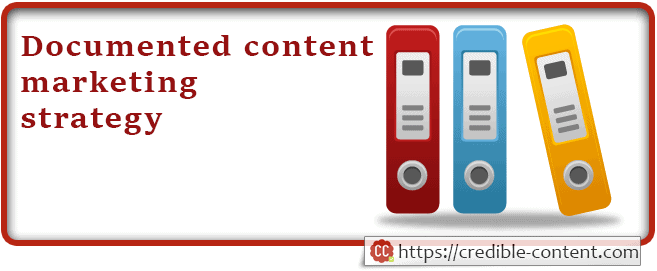Successful content marketing rests on 4 attributes
- Alignment with your organizational goals: What exactly do you want to achieve through content marketing?
- Team collaboration: All the people who are responsible for content marketing use the same tools, use the same language and communicate the same message. They also know what are the success metrics.
- Content distribution: Content publishing should always be complemented with content distribution so that your target audience can access your content and respond accordingly. If there is no method of content distribution, your job is half done.
- Ongoing analytics: Always know what you’re doing and what you are achieving, and this can be best done by analyzing your effort and results.
How do you keep track of these four attributes for successful content marketing?
You need a documented content marketing strategy.
The word “strategy” may seem like a highfalutin word, but it is not. In the realms of content marketing it means

Clearly articulating, in writing, the overall aim of your content marketing. What do you want to achieve ultimately? In how much time?

Whom are you going to target? This is very important. For whom are you going to publish and distribute your content. How should they react? What should they do after getting exposed to your content?

What sort of content you want to create? Do you want to establish yourself as an expert or an authority figure? Do you want to become an information hub? Do you want to educate people? Do you want to make people aware of a new technology or a better way of doing something? Do you want to provide better support to your existing customers and clients?

What content format your audience prefers? Does your audience prefer blog posts? Infographics? LinkedIn? Slides? Videos? E-books? White papers and case studies? Email newsletters?
It is very important to know where to focus your energies otherwise you will be wasting lots of time on creating content that people are not interested in, or don’t want to access simply because they don’t like the format.

Content creation process and scope. In many organizations, especially larger organizations, individual employees are supposed to create content and take care of it. In some organizations there are dedicated content teams.
In multi-layered content marketing teams there are content creators, content editors, content publishers and content distributors. Assign the right people to the right jobs for successful content marketing.

Editorial calendar. Once you set your content marketing in motion you will need to stick to a schedule. Publishing consistency is very important. If you publish two blog posts every week, you must publish two blog posts every week. If you publish one infographic every 15 days, you must publish one infographic every 15 days.
An editorial calendar also allows you to prepare a list of topics that you can cover in the coming days, weeks and months. This way you are never at a loss. You always have something to publish.

Content distribution. The high-quality content that you are publishing needs to reach the right audience to be effective. You have to proactively promote and distribute your content. You can use your social networking profiles. You can make sure that your content is search engine optimized so that people can easily find it on Google and other search engines.

Tracking ROI and analytics. This is one of the most important aspects of a documented content marketing strategy. You need to constantly track your ROI and analytics.
Is your content marketing helping you achieve your goals? Are you attracting the right traffic? Are people doing the right thing when they are on your website or blog? Is the level of engagement fruitful on social media and social networking websites?
The good thing about tracking constantly is that if some structural and directional changes need to be made, they can be made in a timely manner.
So, these are the eight vital components of a documented content marketing strategy that can ensure the success of your content marketing.


